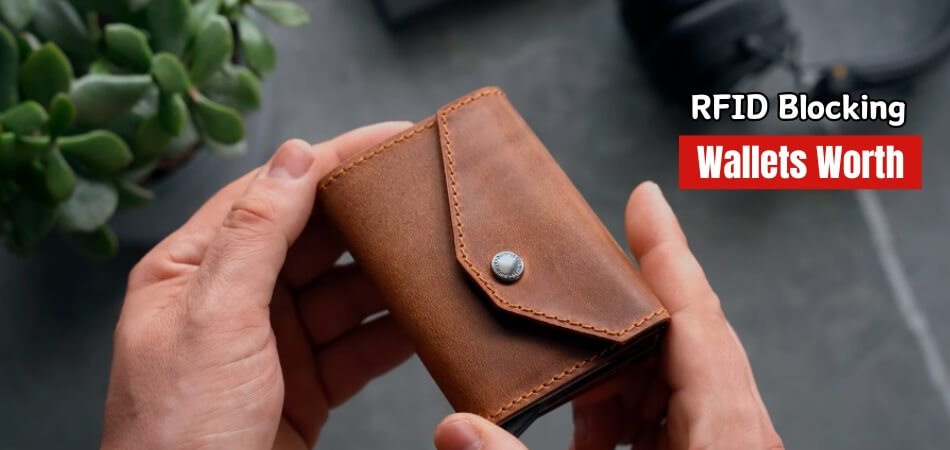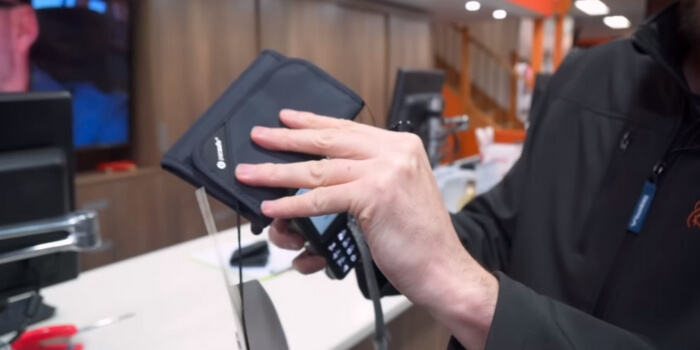The Wallet Defender Product is the latest accessory in the fight against electronic pickpocketing. The sleek design and cutting-edge RFID-blocking technology keep your sensitive info safe. You might wonder, “Are RFID blocking wallets worth it?”
Yes, RFID blocking wallets can be worth it for protecting sensitive information on credit cards and IDs from electronic theft. However, their effectiveness depends on the specific threat level and individual needs.
In this article, we’ll look at RFID-blocking wallets, their pros and cons, and help you decide if investing in one is right for you. Let’s solve the mystery together!
What Are RFID Blocking Wallets?
RFID blocking wallets are specially designed accessories crafted to shield your sensitive information from unauthorized scanning. These wallets utilize the advanced technology to prevent radio frequency identification (RFID) signals from accessing your credit card details or personal data.

One popular example is the Wallet Defender, a sleek and functional accessory equipped with RFID-blocking capabilities. Its innovative design incorporates materials that create a protective barrier against RFID skimming devices, ensuring your information remains secure.
The primary function of RFID blocking wallets is to safeguard your privacy and financial security in an increasingly digital world. By blocking RFID signals, these wallets offer peace of mind, knowing that your sensitive data is shielded from potential threats.
Are RFID Blocking Wallets Worth It?
Yes, RFID Blocking Wallets is Worth It. RFID blocking wallets can provide a layer of security for your sensitive information, especially in today’s digital age where cyber threats are prevalent. With the rise of contactless payment methods, RFID-blocking technology aims to prevent unauthorized access to your credit card details and personal data.

Effectiveness
RFID blocking wallets work by shielding the electromagnetic fields emitted by RFID-enabled cards, preventing potential skimming or scanning by unauthorized individuals. While they can be effective against certain types of RFID skimming, it’s essential to note that not all RFID signals are easily blocked. Some higher-frequency RFID signals may still penetrate the wallet’s blocking material.
Wallet Design
The effectiveness of RFID blocking wallets can vary depending on their design and construction. Look for wallets specifically designed with RFID-blocking materials integrated into the lining or layers of the wallet. Ensure the blocking material covers all compartments where you store RFID-enabled cards to maximize protection.
Card Placement
Proper placement of RFID-enabled cards within the wallet can impact the effectiveness of blocking signals. Keep your cards securely nestled within the RFID-blocking compartments to ensure maximum protection. Avoid leaving cards exposed or loosely placed in areas where the blocking material might not cover adequately.
Signal Strength
The strength of RFID signals emitted by cards and devices can influence the effectiveness of RFID blocking wallets. While most wallets can block signals at close range, they may be less effective against stronger signals or sophisticated skimming techniques. Be mindful of your surroundings and potential security risks in high-traffic areas.
Wallet Quality
The quality of materials and construction of RFID blocking wallets can significantly impact their effectiveness and durability. Opt for wallets made from high-quality materials that offer reliable RFID protection while maintaining functionality and style. Investing in a well-made RFID blocking wallet can provide peace of mind and long-term security for your personal information.
Personal Preference
Ultimately, the decision to use an RFID blocking wallet boils down to personal preference and your level of concern about electronic pickpocketing and identity theft. While they can offer added security, it’s essential to weigh the benefits against the cost and inconvenience of using such a wallet in your daily life.
How Do RFID Blocking Wallets Work?
RFID blocking wallets are designed to protect your credit cards and personal information from unauthorized scanning. They are using some material. Now you are wondering, is materials are safe? They work by creating a barrier that prevents radio frequency identification (RFID) signals from reaching your cards.
Here’s a step-by-step guide to how they work:
- Special Material: RFID blocking wallets are crafted using materials that contain metal layers, such as aluminum or copper.
- Barrier Creation: These metal layers create a shield around your cards, blocking electromagnetic signals.
- Signal Interception: When an RFID reader attempts to scan your wallet, the metal layers intercept the signal, preventing it from reaching the embedded RFID chips in your cards.
- Faraday Cage Effect: This process works similarly to a Faraday cage, which blocks electromagnetic fields by trapping them inside the conductive material.
- Protecting Personal Information: By blocking RFID signals, these wallets safeguard your credit card numbers, expiration dates, and other sensitive data from potential theft.
- Peace of Mind: Using an RFID blocking wallet provides peace of mind knowing that your personal information is safe from digital pickpockets.
- Compatibility: RFID blocking technology doesn’t interfere with the normal use of your cards, allowing you to use them as usual.
- Sleek Design: Many RFID blocking wallets are designed to be slim and stylish, so you don’t have to sacrifice aesthetics for security.
RFID Blocking Wallets Pros and Cons
RFID blocking wallets have gained popularity for their purported ability to protect your credit cards and personal information from digital theft. However, like any product, they come with their own set of advantages and disadvantages.
Pros
- Shields against unauthorized RFID scanning, safeguarding sensitive data.
- Prevents potential identity theft and fraudulent transactions.
- Offers peace of mind when traveling in crowded areas or using public transportation.
- Protects valuable information stored on contactless cards and passports.
- Can extend the lifespan of cards by shielding them from wear and tear.
- Available in various styles and designs, catering to personal preferences.
- Easy to integrate into daily life without significant changes to routines or habits.
Cons
- May add bulk to the wallet, making it less convenient to carry.
- Some wallets may interfere with the functionality of RFID-enabled cards, requiring them to be removed for use.
- Higher cost compared to traditional wallets without RFID protection.
- Effectiveness against RFID scanning can vary depending on the quality of the materials used.
- Limited scientific evidence proves the necessity of RFID blocking for most individuals.
Tips for Choosing the Right RFID Blocking Wallet
In a world where digital security is paramount, choosing the right RFID-blocking wallet is crucial. Here are some tips to guide you in selecting the perfect one:

Material Matters
Opt for wallets made from RFID-blocking materials like aluminum or carbon fiber. These materials create a protective barrier against electronic theft, keeping your cards safe from unauthorized scans.
Size and Capacity
Consider the size and capacity of the wallet to ensure it fits your needs. Look for one that comfortably holds all your essential cards and cash without being too bulky or cumbersome to carry.
Durability
Choose a wallet that is built to last. Look for sturdy construction and quality craftsmanship to ensure your RFID-blocking wallet can withstand daily wear and tear for years to come.
Style and Design
Find a wallet that reflects your style while still offering the necessary protection. Whether you prefer a minimalist design or something more stylish, there are plenty of options available to suit your taste.
Price Point
While price shouldn’t be the only factor in your decision, it’s essential to find a wallet that offers value for money. Consider your budget and compare prices across different brands to find the best option for you.
You can choose the perfect wallet to protect your cards and personal information with these tips. You’re investing in your digital security and peace of mind when you buy a quality RFID wallet like the Wallet Defender.
FAQs for Are RFID Blocking Wallets Worth It?
Would you like to invest in an RFID blocking wallet but have some questions? Here are some questions you might have about RFID blocking wallets:
Do All Credit Cards and Ds Contain RFID Chips?
Not all credit cards and IDs have RFID chips, but many newer cards and passports do. It’s essential to check if your cards are RFID-enabled to determine the necessity of an RFID blocking wallet.
Can My Information Be Stolen Remotely without An RFID Blocking Wallet?
Yes, with RFID technology, thieves equipped with scanning devices can potentially access your information remotely, especially in crowded places where proximity is possible, making protection crucial.
Are RFID Blocking Wallets Effective Against All Types of RFID Scanning?
While RFID blocking wallets can prevent unauthorized scanning at close range, they may not be as effective against long-range or high-powered scanners, although such instances are relatively rare.
Does RFID Blocking Wallets Interfere with Card Functionality?
RFID blocking wallets may slightly hinder the speed of transactions, as they create a barrier against RFID signals. However, the impact on functionality is generally minimal and inconsequential for most users.
Are There Any Downsides to Using RFID Blocking Wallets?
One downside is the potential inconvenience of having to remove cards from the wallet for transactions that require contactless payment. Additionally, some wallets may be bulkier due to the RFID-blocking materials.
Do I Need an RFID Blocking Wallet if I Already Have Chip Protection on My Cards?
While chip protection provides some security, RFID blocking wallets offer an additional layer of defense against electronic pickpocketing and unauthorized scanning, particularly in crowded environments where theft risks are higher.
Are RFID Blocking Wallets Necessary if I Already Keep My Wallet in A Secure Place?
Even if you keep your wallet in a secure location, RFID-blocking wallets provide added peace of mind, especially in public settings where theft attempts can occur without your knowledge.
Are RFID Blocking Wallets Worth the Investment?
The value of an RFID blocking wallet depends on individual needs and circumstances. If you frequently carry RFID-enabled cards or travel to crowded areas, investing in one can enhance your security and privacy.
Last Word
RFID-blocking wallets are essential for protecting your sensitive data. Consider factors like material quality, wallet design, and personal preference when choosing.
Are RFID Blocking Wallets Worth It?? They’re a great way to protect yourself from identity fraud and electronic theft. To make sure your wallet meets your needs, prioritize durability, functionality, and style.
Even though choosing a wallet incorrectly may seem minor, the consequences of digital theft can be huge. Invest in a quality RFID-blocking wallet and you’ll be protected for years.






